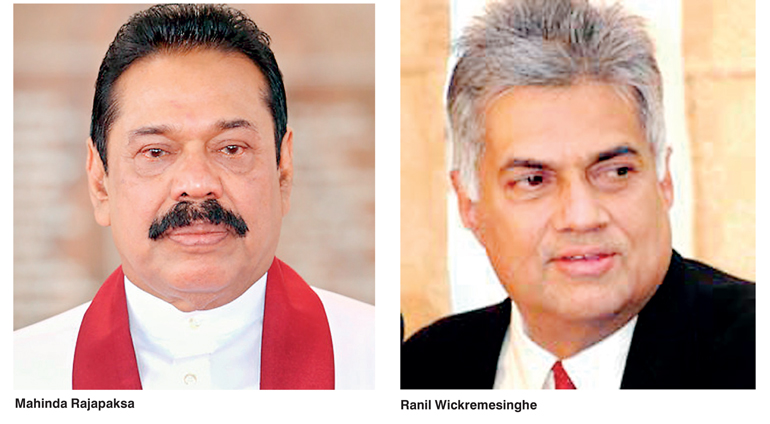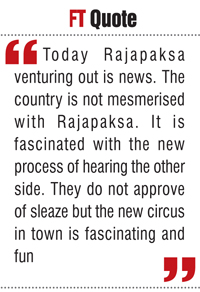Tuesday Feb 17, 2026
Tuesday Feb 17, 2026
Saturday, 20 June 2015 00:00 - - {{hitsCtrl.values.hits}}
“A tale is told of a man in Paris during the upheaval in 1948 who saw a friend marching after a crowd toward the barricades. Warning him that these could not be held against the troops, that he had better keep way, he received this reply, “I must follow them. I am their leader” - ‘Conflicts of Principle’, Lawrence Lowell, President Harvard University

A sanguine President Sirisena plans to thwart a rebounding Rajapaksa. A restless Ranil relies on a chagrined Chandrika to offer SLFP support after elections to keep him in office.
The adjectives applied to these principal protagonists decidedly describe the dialectics of our post-January democracy.
The present dissonance in Parliament is mostly due to Ranil Wickremesighe’s self-deception that Nimal Siripala De Silva will be as accommodating to him as he was to Mahinda Rajapaksa in the role of a simulated Opposition Leader.
The anti-Rajapaksa movement lost a great opportunity when the UNP wise guys decided to hound officials and politicians who squandered state resources in promoting the candidacy of President Rajapaksa for a third term. If the TRC spent millions in distributing ‘Sil’ shrouds, if Divi Neguma spent more millions distributing calendars, and a Minister distributed ‘Sathosa’ dhal taken on  credit, the candidate Mahinda Rajapaksa should have been charged for violating election law. The law provides for filing an election petition against even the loser. If the charges were tenable the courts would have imposed the applicable punishment – the loss of civil rights for six years.
credit, the candidate Mahinda Rajapaksa should have been charged for violating election law. The law provides for filing an election petition against even the loser. If the charges were tenable the courts would have imposed the applicable punishment – the loss of civil rights for six years.
Meanwhile, in open court all those who aided and abetted could have been grilled by the same three eminent lawyers of the Pitipana Committee who have produced a ‘Pana Yana’ report on the bond business.
The Mahanayakes, who frowned upon the upright Buddhist Diyawadana Nilame being questioned by the FCID, would have applauded the move. Wickremesinghe could have worshipped at Dambulla and brought home the iguana for dinner.
Toppling the tyrant is the easy part. Erasing the traces of tyranny takes time. Democracy cannot function in the absence of an Opposition. ‘Thinking publicly different and otherwise’ is the holy writ of the doctrine of democracy. ‘Institutionalised distrust’ is the sine qua non in the practice of parliamentary democracy.
For more than a decade the country has not seen either a vibrant, veiled or vulgar Opposition engaged in sustained confrontation. Kumaratunga faded into oblivion not because she was irrelevant. An intimidated media, in Pavlovian servility, erased her just as they made the former General a footnote in history. They were terrible times. This writer ventured out to get a glimpse of the public indignation at the impeachment of the CJ and returned from Hulftsdorp with a bruised shoulder and without an expensive pair of Dr. Scholl’s slippers.
Today Rajapaksa venturing out is news. The country is not mesmerised with Rajapaksa. It is fascinated with the new process of hearing the other side. They do not approve of sleaze but the new circus in town is fascinating and fun.
Wickremesinghe is the monitor of the class appointed by the ‘principal’. He threatens to report miscreants to the ‘principal ‘and reduces it to a farce. Instead of responding to members of the Opposition, he tells them to sit down. He even threatened to get the President to give them a few ‘tokkas’. With that poor display of puerile adolescence, Wickremesinghe and his party members are now distressed that the President is not stern enough with the part of the SLFP which sits in the Opposition.
The UNP has decided to forget that Maithripala Sirisena was the insurgent candidate of the SLFP. Parliamentarian Dulles Alahapperuma has unwittingly stumbled on a reality. At his last media briefing he said: “The President had an agreement for 100 days with Ranil Wickremesinghe. He has another five-year agreement with former President Chandrika Kumaratunga.”
Kumaratunga factor
 The triumvirate behind the Rajapaksa restoration project – Dinesh Gunawardene, Banduala Gunawardene and Wimal Weerawansa - know their business. They have identified their target.
The triumvirate behind the Rajapaksa restoration project – Dinesh Gunawardene, Banduala Gunawardene and Wimal Weerawansa - know their business. They have identified their target.
Chandrika Kumaratunga does not possess the raw allure of Mahinda Rajapaksa.
Hindsight bias impacts her sheen. What she does possess is the ability to revive the propositional content of the party of her parents and infuse it with the performativity it once had in attracting the elite segments of liberal politics.
Kumaratunga did make mistakes during her tenure. Yet history will treat her kindly. She made devolution of power a palatable proposition. She removed the tunnel vision of Sinhala chauvinism. If Lakshman Kadirgamar was the greatest foreign minister, surely she deserves the credit of appointing him to the role and ensuring the international isolation of the tigers. She had her faults. If only Archduke Franz Ferdinand slept a little longer on that fateful morning in Sarajevo. If only Chandrika allowed Justice Mark Fernando to take his turn.
In their evidently successful demonstrations in Kurunegala and Matara, the pro-Rajapaksa team brilliantly choreographed their anti-Kumaratunga act. The last performance at Matara was dazzling due to its counterfeit precision of execution.
The arch demagogue, Wimal Weerawansa, reduced the shrill crescendo effect and whispered, “Chandrika”. Then he paused in anticipation. Derisive hooting erupted. Weerawansa built up again and reached a high note only to end abruptly. It was a performance that matched the likes of Toscanini or closer home a Zubin Mehta.
For Kumaratunga, the retrieval and resurrection of the SLFP is as important as ousting the despot. That makes Kumaratunga the principal target of the Knights Templar cartel at Abayaramaya.
President Sirisena is battling to keep faith with the covenant he made with the rainbow coalition. Though determined to thwart the narcissistic mass dictator, he knows that he is in a difficult situation. Effective leaders in bad situations combine resolute moral purpose with impressive empathy. This essential truth and materiality of the ‘Peasant from Polonnaruwa’ has escaped the attention of his interim Prime Minister. As former General Secretary of the SLFP he seems confident of his ability to ride out the storm by separating the turncoats from the sycophants.
Former President Mahinda Rajapaksa is definitely on the rebound. It is equally evident that nearly half of the electorate refuses to believe that he is the villain his opponents claim him to be. His political machine is in top gear. His trust networks of clergy and clients are highly motivated. A country which has not seen a functioning Opposition in two decades of repressive governance coupled with a collusive Opposition is watching the antics in Abayaramaya with justifiable shock and awe.
Affable autocrat
This autocrat succeeds not so much through his brutality but because of the enthusiasm of a segment of the self-serving middle-class which opted to side with him. Rajapaksa was indeed a transactional leader.
He developed his own momentum of social influence. As pointed out by Hobsbawm in the case of Nazi Germany, our affable autocrat became the only leader who offered a solution to the chaos he himself created. It convinced a substantial part of our society that his was an effective political and legislative system that should be endorsed by rational law-abiding citizens.
Democracy cannot function in the absence of an Opposition. ‘Thinking publicly otherwise’ and ‘institutionalised distrust’ are essential ingredients of a parliamentary democracy. Wickremesinghe acting as monitor of the class threatening to report miscreants to the ‘principal’ is a reminder of how far we have drifted away from parliamentary democracy.
On the 18th Amendment the then-Leader of the Opposition opted to walk out. He refused to nominate a member to the enfeebled Constitutional Council. More than Rajapaksa, the toothless, incompetent UNP Opposition is responsible for the erosion of our democracy.
During the last decade, under autocratic leaders, the UNP and the SLFP have disintegrated into power cliques held together on the promise of political spoils when elected to office. Democracy needs strong and sustainable political parties with the capacity to represent citizens. But not anymore. With the near total disconnect between citizens and elected leaders and the growing corporate sophistication of oligarchs, political parties have become leader-focused and leader-driven.
When former President Chandrika Kumaratunga announces that the SLFP will not tolerate the intolerant among them, she gives hope to those who yearn for ideology-driven political movements.
Karl Popper wrote: “If we extend unlimited tolerance even to those who are intolerant, if we are not prepared to defend a tolerant society against the onslaught of the intolerant, then the tolerant will be destroyed, and tolerance with them.”
President Maithripala Sirisena promised an all-party Government with the leader of the UNP as Prime Minister for 100 days. The next parliamentary elections should be held under an all-party caretaker Cabinet of 10 Minsters.
(Sarath De Alwis is a former journalist and retired professional from the leisure and aviation industries)